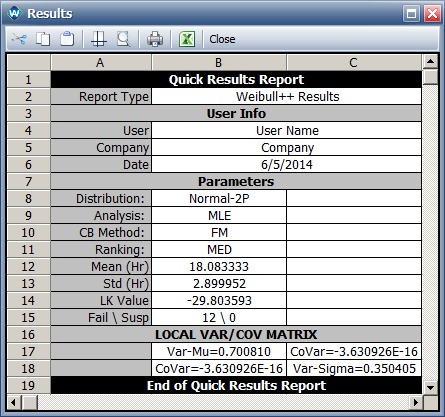Normal Distribution with MLE Solution: Difference between revisions
Jump to navigation
Jump to search
Kate Racaza (talk | contribs) (Created page with '{{Reference Example}} This example compares the variance and covariance matrix for a Normal distribution with ML estimates. {{Reference_Example_Heading1}} The data set is fr…') |
Kate Racaza (talk | contribs) No edit summary |
||
| (One intermediate revision by the same user not shown) | |||
| Line 1: | Line 1: | ||
{{Reference Example}} | {{Reference Example}} | ||
This example | This example validates the calculations for the variance and covariance matrix for a Normal distribution with ML estimates in Weibull++ standard folios. | ||
| Line 11: | Line 11: | ||
{{Reference_Example_Heading2}} | {{Reference_Example_Heading2}} | ||
The failure times of the components are: 14, 18, 18, 20, 21, 22, 22, 20, 17, 17, 15, 13. | |||
| Line 24: | Line 24: | ||
{{Reference_Example_Heading4}} | {{Reference_Example_Heading4}} | ||
The following picture shows the results in Weibull++. | |||
[[Image:Normal_parameters.png|center]] | [[Image:Normal_parameters.png|center]] | ||
Latest revision as of 16:19, 28 September 2015
New format available! This reference is now available in a new format that offers faster page load, improved display for calculations and images and more targeted search.
As of January 2024, this Reliawiki page will not continue to be updated. Please update all links and bookmarks to the latest references at Weibull examples and Weibull reference examples.

